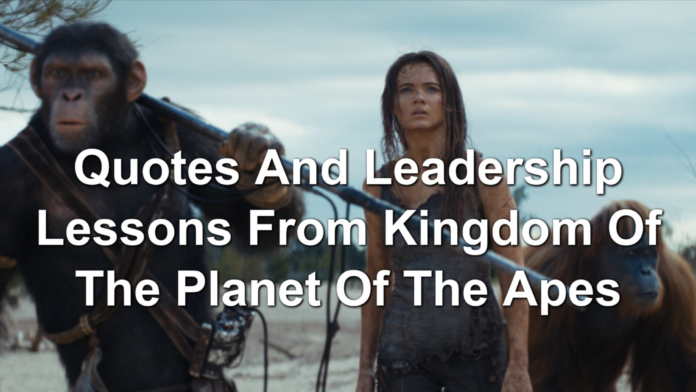This weekend, moviegoers returned to the world of the Planet Of The Apes. Kingdom Of The Planet Of The Apes is the fourth film in the rebooted series. However, it is the tenth film in the overall Planet Of The Apes series.
The film picks up shortly after Caesar’s death. Caesar was the leader of the apes in the earlier films. Generations after Caesar’s death, there are many different clans of apes. Most shockingly, the humans have become feral.
The ensemble cast was great. We even got a cameo by William H. Macy as Trevathan.
But let’s dispense with what the movie is about. You’re here for the leadership lessons in Kingdom Of The Planet Of The Apes. We’re diving in.
Quotes And Leadership Lessons From Kingdom Of The Planet Of The Apes
1. Opening Text:
For thousands of years, humans ruled the world. Their hubris caused their downfall.
The film opens with the above quote. It’s powerful. It tells the story of many leaders in many organizations.
Their hubris, exaggerated pride or self-confidence, may have brought them to the top of their organization. Once there, that hubris became a liability.
They began to make unwise decisions. They thought they were untouchable. Then they fell.
Watch yourself as you rise through the ranks. Don’t let your hubris be your downfall.
2. Great organizations understand the impact of their actions:
Noa (Owen Teague) belonged to the Eagle Clan of apes. These chimps would have a bonding ceremony where young chimps would choose an eagle egg that spoke to them. They would bond with these birds and stay loyal to one another.
It was time once again for the bonding ceremony. Noa, along with fellow chimps Anaya (Travis Jeffery) and Soona (Lydia Peckham), climbed up dangerous cliffs to get eggs for the ceremony. When they got to the bird nest, they discovered there were three eggs. There were three apes. They could each get an egg.
Good, right? Wrong…
The Eagle Clan had a rule. They would always leave one egg for the mother bird.
This clan understood the impact of their actions. By taking every egg, there would be no wild eagles for future generations.
We have to be forward-thinking leaders. We have to think about the future generational impact our organizations will have.
Look to the future. Understand what kind of legacy your actions will leave.
3. Koro (Neil Sandilands):
Much to learn. Much to teach.
Koro was Noa’s father. They had a contentious relationship, yet they loved each other.
After Noa returned from hunting the bird eggs, he went to see Koro. Koro smelt the stench of an Echo (humans) on Noa’s blanket.
This meant trouble.
Koro scolded him. He told Noa he wasn’t allowed to go to the forbidden land where the humans resided. After Noa told Koro what happened, Koro relented.
He also told Noa there was much to learn and much to teach.
You know what? There will always be much to learn as a leader. We should constantly grow our expertise.
Our responsibility as a leader doesn’t stop there.
We also have a responsibility to teach others. Once you’ve learned something, find a way to pass it on to another team member.
4. We can survive a fall:
Proximus Caesar (Kevin Durand) had a clan of apes that purported to follow Caesar’s teachings. They wore masks and caused trouble. We discover this isn’t true as the movie progresses.
What happened after Proximus Caeasr was introduced? He killed other apes. Then attacked Noa’s clan.
He chases down Koro and climbs a tower in the village. He attacks ruthlessly. Noa jumps in to save his father.
Noa’s attempts to save Koro don’t go well. He’s knocked out of the tower, falling what looks like hundreds of feet.
We see Noa tumbling. Flailing. Screeching.
He hits the ground. The screen goes black. Is he dead?
No… Just unconscious. He survives the fall.
Sometimes, we make decisions so bad they feel like an epic fall. Something we’ll never be able to recover from.
I want to encourage you. You can recover from a leadership fall.
You have to work on it. You have to show that you’ve changed. You may even have to pay restitution.
If you fall, get back up.
5. Raka (Peter Macon):
Explain yourself.
After Proximus Caesar kidnapped the people of Noa’s clan, he set out to find them. Noa’s pursuit of his people became challenging when he fell through a hole and into Raka’s world.
Raka is an old, wise ape. He’s suspicious of Noa. Especially since Noa had one of the weapons the masked apes carried.
Before Raka would attack, he asked Noa to explain himself.
Raka took this opportunity to avoid a misunderstanding. He didn’t jump to conclusions; he asked for an explanation.
What would happen if more leaders were like Raka? Could we be more inquisitive before we pass judgment?
We’d see a lot more interaction from our teams. They would see a more curious, less judgmental leader wanting to help them.
Let’s stop jumping to conclusions.
6. Bad leaders will twist the memory of great leaders:
The masked apes used Caesar’s name for conquest, for violence. They made him out to be vicious.
The idea the masked apes had of Caesar wasn’t who Caesar was.
Upon meeting Noa and allowing him to explain himself, Raka shares Caesar’s true history. He was not the twisted version that had been created since his passing.
Raka goes on to tell Noa that humans were important to Caesar. They had lived side by side. They weren’t the enemy.
Those in the latest leadership position can twist the image of past leaders. Those who come after can use the memory of a leader to inspire heinous acts within an organization. They can make it out to seem as if the founder was someone they were not.
Beware of those who twist the image of those who come before.
7. Raka:
Show mercy.
A young Echo girl follows Raka and Noa. Raka tosses the young girl some fruit. The girl, who we learn is named Mae (Freya Allan), scoops the food up and devours it.
Raka also tells Noa humans get cold. He takes Noa’s blanket and begins to give it to Mae. Noa hesitates. He tells Raka the blanket is important.
This is when Raka tells Noa to have mercy.
Because of your role and position, you have the opportunity to show mercy to those you lead… and to those you don’t.
Be willing to be kind, have mercy, show grace. The best leaders I’ve ever seen were leaders who showed mercy when they didn’t need to.
8. There are reasons to break the rules:
Noa leaves Raka and Mae to go find his tribe. As he leaves, the masked apes attack Raka and Mae.
Upon seeing this, Noa returns. He’s willing to help his newfound friends.
Raka takes up the battle, too. He fights off the attacking masked apes. He’s not thrilled about it as Caesar had said apes don’t attack other apes.
After the battle, Raka states that Caesar would forgive this act of violence against other apes.
We have rules for a reason: to keep order. Typically, a new rule is created once someone does something stupid that could hurt the organization, etc. These rules are put in place to put boundaries around our actions.
But…
Rules can also hinder our ability to do what’s right. It can also hurt those we lead. Sometimes, we have a great employee who’s facing issues at home. This causes tardiness, absences, and more. The rules state this person should be fired.
Should we?
It depends on their work ethic, how well they do their work, and if this is habitual.
There are times to break the rules. Understand when and where it’s acceptable.
9. Noa:
I judge myself.
Koro’s eagle comes to Noa. Noa and the eagle had a rough relationship. The eagle would constantly attack Noa. It wouldn’t listen. And it would make him feel foolish.
After Koro’s death, the taunts continued from the eagle.
The eagle returned to Noa late in the movie. Noa asks the eagle if he judges Noa. And then Noa tells the eagle he judges himself.
Leaders are often their harshest critics. They understand they have a difficult job to do. Their actions impact those around them. They make mistakes.
And so they hold themselves accountable. They judge themselves.
While you will judge yourself, don’t judge yourself too harshly. All leaders will make mistakes. Learn from those and grow.
10. Find a rallying cry:
Proximas Caesar had beaten down Noa. He was struggling to get up from the beating when he began singing his clan’s song.
The other Eagle Clan members are nearby. They hear Noa sing.
The clan joins in.
The song calls in the birds of the other clan members. These birds then attack Proximas Caesar and help save the day.
The bird song was the Eagle Clan’s rallying cry. What about you? Does your organization have a rallying cry?
It may not be a song. Your rallying cry could be a mission statement everyone recalls. It could be a story of success your organization has accomplished. It could be something else.
Go, find a rallying cry your people can rally around. It will bring people together in the darkest days of your organization.







